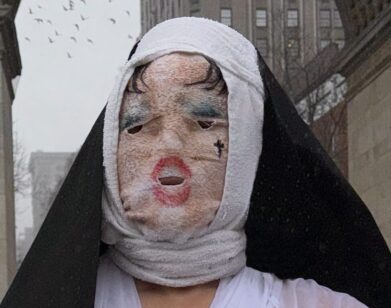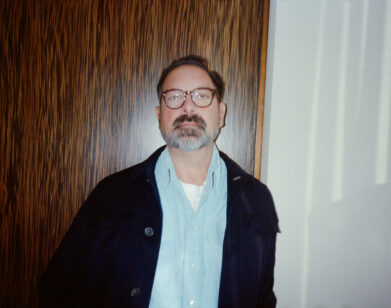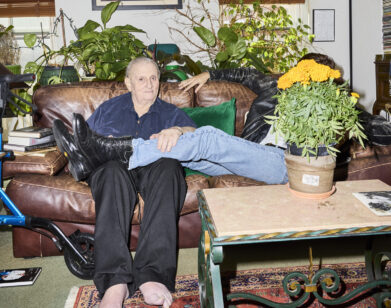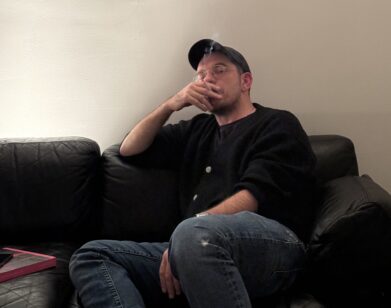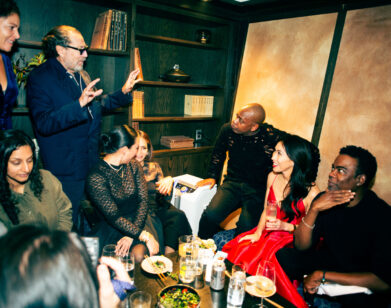Lily Rabe’s Summer Camp
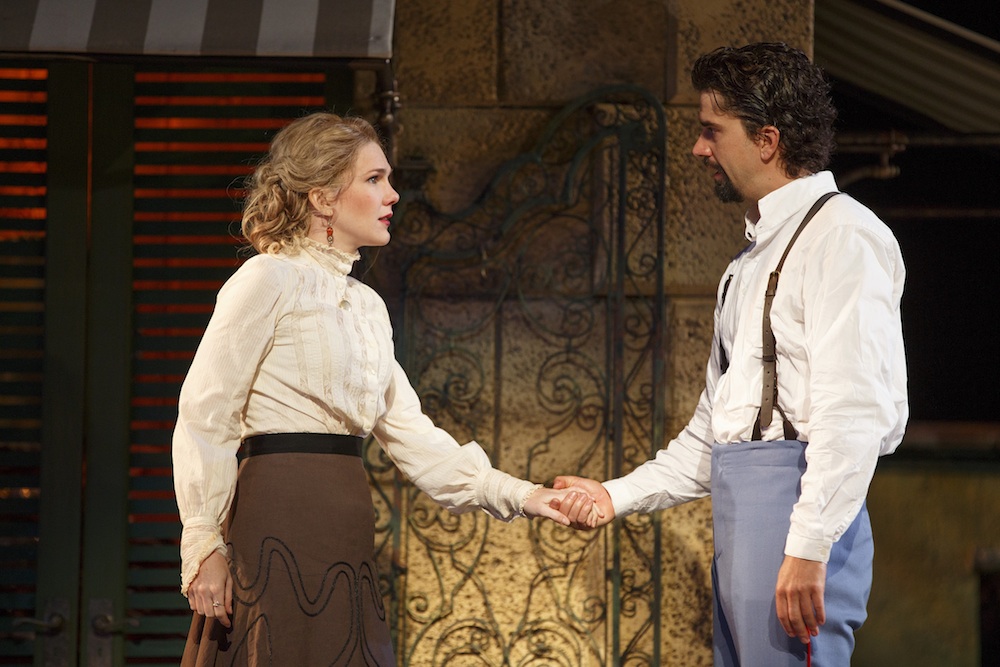
ABOVE: LILY RABE AND HAMISH LINKLATER IN MUCH ADO ABOUT NOTHING. PHOTO COURTESY OF JOAN MARCUS.
In 2010, Lily Rabe acted opposite Al Pacino in The Public’s Shakespeare in the Park production of The Merchant of Venice. Among the thousands of people who saw her Tony-nominated performance was Steven Spielberg. He didn’t forget about it; later this year Rabe will star in the new Spielberg-produced show, The Whispers.
The Public didn’t forget about Rabe either. This season marks the actress’ third production in the park (she did As You Like It in 2012). The 31-year-old actress plays the clever, sharp-tongued, ahead-of-her-time Beatrice in Much Ado About Nothing. Her friend and frequent co-star Hamish Linklater fills the role of Beatrice’s antagonist-turned-love interest, Benedick. Their chemistry is quick, hilarious, and surprisingly modern.
Most people might recognize Rabe from the television anthology American Horror Story, but, as the daughter of playwright David Rabe and actress Jill Clayburgh, she was raised in the theater. We spoke with the actress before the play’s opening night performance tonight.
EMMA BROWN: You seem to have an every-other-year setup with Shakespeare in the Park.
LILY RABE: [laughs] That’s what it’s become. [It] wasn’t deliberate, but I’m certainly thrilled to be doing it every other year. It seems like a great policy.
BROWN: What do you do with your summers off—are you working on other projects or can you relax?
RABE: On other summers I sit around and am jealous of whatever is going on in the park and go see it and love it. I guess I’ve been working mostly, but I ache for it. I ache for it year-round, but especially the summers. It’s the only place I really want to be.
BROWN: Are the same people in the crew every year? Do you have a nice group that gets to reunite every summer?
RABE: A lot of them are. There are always new faces, but that is one of the wonderful things about working in the park—and I think about the Public Theater—there is a of sense of repertory theater, this sense of a company. There are people in the crew who’ve been there every production that I’ve done, for sure. And they’ve been there on the summers I haven’t been there, too. Lucky ducks. When you do a play, especially in a longer run, I’ve found that even if everyone hangs out in the beginning, people have to go on with their lives and there isn’t as much going out for drinks or dinner after the show. But in the park, every year I’ve done it, most nights of the week you stay together. Everyone can’t get enough of one another and that includes the whole gang—the youngest to the oldest members of the cast.
BROWN: Do you remember your first encounter with Shakespeare?
RABE: I have all sorts of scattered memories of seeing Shakespeare productions when I was very little. I think there’s this amazing thing with Shakespeare; even when you’re way too young to begin to understand any of it, it sort of penetrates you. It seeps into your pores like poetry and connects. The rhythms of the language, the sounds of the language, the way he puts every word together, and the way it can make you laugh so many years before you have any sense of why it’s funny.
I remember in fourth grade I played Hermia [in A Midsummer Night’s Dream]. I was really short in fourth grade until high school. Now, I’d have to play Helena, but in fourth grade I was right for Hermia. We were doing some school thing where we did a scene of Shakespeare. I remember it was the part where Hermia wakes up from the nightmare and I had to say “breast.” She’s having this nightmare that there’s a serpent crawling on her breast. I remember just sobbing because I was so embarrassed that I had to say that in front of all these other fourth graders, not realizing that I was really just talking about my chest. [laughs]
BROWN: Did they tease you at all?
RABE: Oh sure, yeah. Fourth graders? I was teased a ton.
BROWN: Do you think a play gets better at the end of a run? Or do people get worn out?
RABE: I think it gets better and better. Especially with Shakespeare, you learn so much every performance and there are so few precious performances in the park. By the end of the run I feel like we’ve just started doing it.
BROWN: Is there a particular moment when you know that if the audience laughs, you’ll be okay for the rest of the night?
RABE: With Shakespeare I find that there’s a moment—and I feel like it’s always around 10 minutes in—where you hear the audience’s ear drop in completely. In the beginning your ear is adjusting to the language. It probably usually is a laugh and they are totally locked in. I do find that. But I try not to think about the laughs that I’m going to get or miss because that will just make me more nervous. [laughs] I do check my hands to see how much they’re shaking before my first entrance, and sometimes it’s a lot and sometimes it’s less. I have no idea why one day it’s more than the next, or less than the next.
BROWN: Do you find yourself thinking in Shakespearean language offstage?
RABE: [laughs] I guess in the sense that I feel like it just becomes one. I don’t feel like, oh, now I’m speaking in this other way. It doesn’t feel like it takes 10 minutes of thought for them to connect. I think it has so much to do with rhythm; that rhythm of different people’s writing definitely gets into my head and into my dreams and things.
BROWN: Do you ever have an off night where you feel that, for some reason, your performance is just falling flat?
RABE: Definitely. Yes. You have a sense of why that happened, and sometimes it feels like an absolute mystery. I think—I hope —that the discrepancy, the sort of level of off-ness, feels much bigger to you than to the people watching. You have off nights and then you have nights where it just feels like there’s even more magic than an average night.
BROWN: Beatrice has some great, sharp lines. Is there one that you particularly relish in saying?
RABE: Oh, yeah. I fall in love with a new line every night, but it’s not necessarily mine. So much of it is just listening. This play, probably more than any of the plays I’ve done in the park, I’m sort of on and then off and then on, so there’s no time to ever go back to my dressing room, which is great. I sit backstage, which is basically sitting in the middle of the park, and listen to the play. I am struck by a new line every night. When Beatrice comes out to send Benedick to dinner, Benedick repeats what she said —”Against my will, I am sent to bid you come in to dinner”—[and then adds] “There’s a double meaning to that.” Every time I hear it I put my head in my lap and think, gosh, we’re exactly the same as we were then. [laughs]
BROWN: Do you think that the qualities that make someone a good theater director are different from the qualities that make someone a good film director?
RABE: I think they’re the same; it’s someone’s specificity and confidence. That, to me, is the great thing, because it gives you the most freedom. Dan [Sullivan] and Jack [O’Brien], the two directors I’ve worked with for Shakespeare in the Park, are very, very different, but they definitely share certain qualities as directors; they have such a clear understanding of the language and such a clear feeling about their production. It lets you feel like you can be braver and there’s this wonderful solid ground beneath you to run around on and trip on and fall down on. You’re not going to fall through the earth. Of course it feels really different, being directed in a film, but it’s that same quality that I’m really attracted to in directors.
BROWN: I had forgotten that Pedro Pascal was in Much Ado. I was a little surprised when he walked out. My last image of him is getting his head squished in Game of Thrones.
RABE: I know. I haven’t seen his head-squish yet. Pedro’s a long-time friend and, from what hear, I don’t know that I want to see my friend’s face like that. [laughs] But I’ll suck it up, ’cause he’s a great actor.
MUCH ADO ABOUT NOTHING OFFICIALLY OPENS TONIGHT, JUNE 16. FOR MORE INFORMATION, VISIT THE PUBLIC THEATER’S WEBSITE.

